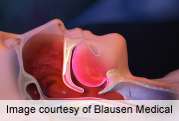Evidence from published observational studies suggests that maternal sleep-disordered breathing is associated with increased risk of gestational hypertension and gestational diabetes, according to research published in the January issue of the American Journal of Obstetrics & Gynecology.
(HealthDay)—Evidence from published observational studies suggests that maternal sleep-disordered breathing is associated with increased risk of gestational hypertension and gestational diabetes, according to research published in the January issue of the American Journal of Obstetrics & Gynecology.
Sushmita Pamidi, M.D., of McGill University in Montreal, and colleagues conducted a systematic review of the literature and meta-analysis of selected studies to assess the association between sleep-disordered breathing and risk of adverse pregnancy outcomes, including gestational hypertension/preeclampsia, gestational diabetes, and low-birth-weight infants.
The researchers found 31 studies that met the defined criteria; 21 studies, all observational, reported dichotomous outcomes, and nine of these studies adjusted for potential confounding variables. Maternal sleep-disordered breathing was significantly associated with increased risk of gestational hypertension/preeclampsia (pooled adjusted odds ratio [aOR], 2.34; five studies) and gestational diabetes (pooled aOR, 1.86; five studies).
"Based on published observational studies to date, maternal sleep-disordered breathing is associated with an increased risk of gestational hypertension and gestational diabetes after adjusting for potential confounders," the authors write. "However, large-scale, prospective cohort, and interventional studies are needed to further elucidate the relationship between maternal sleep-disordered breathing and adverse pregnancy outcomes."
More information:
Abstract
Full Text
Journal information: American Journal of Obstetrics and Gynecology
Copyright © 2014 HealthDay. All rights reserved.



















